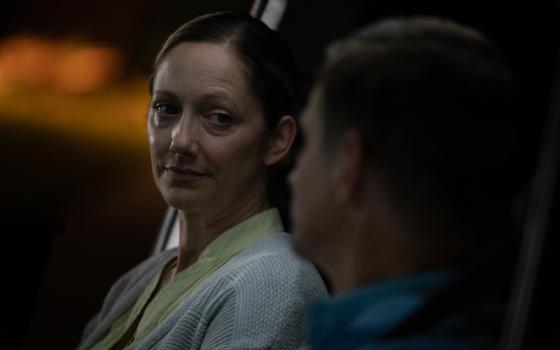
Susan Crane (left), a Catholic Worker from Redwood City, California, takes her anti-nuclear message inside Büchel Air Force Base in Büchel, Germany. (Courtesy of Susan Crane)
Eighty-one-year-old Susan Crane's 230-day prison sentence was nearly over. She prayed inside Martin Luther Evangelical Church in Koblenz, Germany, on New Year's Eve, as the American grandmother of four had done many times during her stay in prison, which granted her weekend furloughs to attend church.
She listened as the pastor belted out Dietrich Bonhoeffer's poem "By Gracious Powers" with the congregation singing along.
The poem, found in Bonhoeffer's cell shortly after Nazi Germany forces executed him under charges of attempted assassination of Adolf Hitler, conveys a message he meant for his family.
"I really related to it," said Crane in a phone interview one day after she arrived home in Redwood City, California. "I hoped to be with others."
Crane was imprisoned for breaking into Büchel Air Force Base to protest the stationing of American nuclear weapons in Germany and for refusing to pay a fine. For three decades, Crane protested nuclear weapons in the U.S. and in Europe. She's poured her own blood on a nuclear destroyer and taken a hammer to warplanes. In total, she said she's served around seven years in prison.
Büchel Air Force Base trains German soldiers to drop hydrogen bombs on behalf of the United States if necessary as part of NATO's nuclear sharing arrangements. Crane finds inspiration in the Catholic Worker Movement that preaches, among other things, "Swords to Plowshares," taking the Hebrew Bible verse Isaiah 2:4 — "He shall judge between the nations, and shall decide disputes for many peoples; and they shall beat their swords into plowshares, and their spears into pruning hooks; nation shall not lift up sword against nation, neither shall they learn war anymore" — and shifting it toward nonproliferation efforts.
Advertisement
This was Crane's first prison sentence in Europe, and it coincided with a turning point for the nonproliferation movement.
With the rise of the far right in Eastern Europe and the war in Ukraine, public approval of the nonproliferation movement has suffered, said Stephen Herzog, professor of the practice at the James Martin Center for Nonproliferation Studies in Monterrey, California.
For the first time in modern German history, most Germans favor the stationing of U.S. nuclear weapons, according to a mid-2022 poll from infratest dimap, a German political research institute. In 2023, over 60% of Germans told researchers from Erasmus University Rotterdam in the Netherlands that stationing of U.S. nuclear weapons deterred nonnuclear attacks.
Herzog said Germany used to spend less on defense than other NATO states, drawing criticism from the United States. It wasn't until 2022 that the country, led by German Chancellor Olaf Scholz, announced it would spend 2% of its GDP on its military, as decreed by NATO policy. The issue of Germany's defense budget issue remains widely debated, which may lead to Scholz's ousting as chancellor during this month's election.

A painted banner from Crane’s protest (Courtesy of Susan Crane)
Crane was released from prison on Jan. 17. She returned to the U.S. the same day as President Donald Trump's second inauguration. Crane said her German colleagues, or "comrades," as she refers to them, offered to help her fill out asylum papers to stay in Germany. She said they don't understand how Americans could elect someone who poses such a threat to human rights and democracy.
"People over there have been through the rise of fascism before, so they've seen it," Crane said. "It's a war, making violent empires we're living in right now."
Paul van Hooft, a research leader for defense and security at RAND Corp., said anxiety over nuclear weapons in Europe intensified with Russian President Vladimir Putin's invasion of Ukraine and his loosening of Russia's doctrine for using nuclear weapons. European countries started to reevaluate their defense strategies.
Trump's reintroduction to the global stage and the far right's influence on foreign policy complicates their strategy, he said. Van Hooft noted the new urgency when he addressed government officials on nuclear weapons in the Netherlands, where he is based.
"I receive a lot of questions on how they work: What do they do? How dangerous are they?" van Hooft said. "Analysts, politicians can't avoid thinking about it and thinking about 'Plan B' and thinking about alternative solutions."
Alternative solutions motivate nonproliferation activists like Art Laffin, a Catholic Worker and author of books documenting the movement. He said Crane's protests in Europe are not typical for American activists but have become more frequent in recent years. Coordination with German, Dutch and British groups became necessary with the "nuclear threat hanging over humanity," he said.
Even if some view her actions as extreme, Crane said they are in line with Scripture.
"We need to love one another," Crane said. "I'm not telling people what they should think or what they should do, or what even they should think Christianity is about. I was telling them what I believe."
She said her first visitors in prison were anarchist youth groups from Germany. She said they did not share religious beliefs but held the same ethical objections to war.
"There's a lot of commonality with people who think we need to talk instead of fistfight or use nuclear weapons," she said.
That view inspires nonproliferation activists serving time in German prisons. Crane served her prison sentence alongside Dutch activist Susan van der Hijden and preceded Brian Terrell, an Iowa Catholic Worker who will start his sentence on Feb. 26 for a 2019 protest.
When asked if she had any advice for Terrell, Crane said she spoke with him from prison about their work and mission after his sentencing.
"I congratulated him," Crane said.




